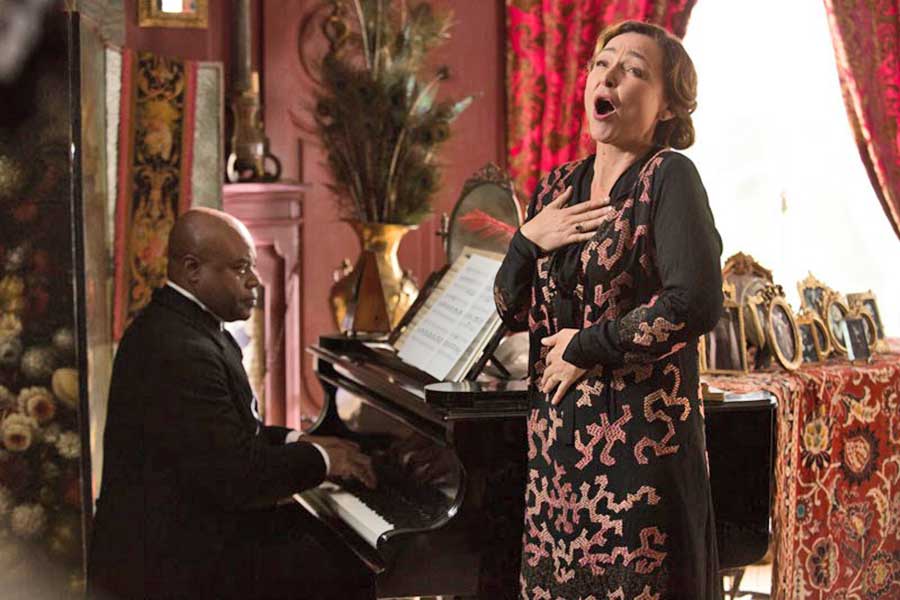Who doesn’t love a diva? In the satirical French film “Marguerite,” opening March 25 at Ritz Theaters, the title character (a superb Catherine Frot) is a wealthy music lover in 1920 Paris who fancies herself to be an opera singer. But she can’t sing a note — any note — in key. However, no one — not her husband Georges (André Marcon), who makes up excuses for missing her concerts; her friends; or even her African butler, Madelbos (Denis Mpunga), who manipulates things behind the scenes — will tell her she’s talentless.
Instead, Lucien Beaumont (Sylvain Dieuaide), a journalist, writes a review that encourages Marguerite to perform a concert. And Madelbos blackmails the gay Atos Pezzini (Michel Fau) to give the would-be coloratura (think Florence Foster Jenkins) vocal lessons. How “Marguerite” plays out is what makes this film fun.
Writer/director Xavier Giannoli chatted with PGN about making “Marguerite.”
PGN: If you were one of the members of Marguerite’s social circle, would you blindly applaud her performance, or sit her down and tell her she’s talentless?
XG: This is the first time someone asked me that! I think we all need illusion to stay alive. I would never tell her the truth. It’s a matter of having respect for her and her illusion. But I will not take advantage of my lie — that’s the difference. She’s off key and out of tune, but there is something deeply honest about her. Besides, I also don’t want Marguerite to tell the truth about me! Is it important to say the truth? Of course, when today politicians are selling illusion to the people; that’s a case where it’s important to tell the truth. But there are not such high consequences with Marguerite.
PGN: The film is about finding your voice — literally and figuratively. How does this message resonate with you as a filmmaker?
XG: Your voice is in the middle of yourself. When you are looking for your voice, you are looking for yourself. My film is about innocence. I still have, I hope, something innocent in myself. But there is always that terrible moment when you are with your illusions and you wake up in the violent, real world. Some people can’t handle reality. They use drugs or find theology, or become obsessed with something.
PGN: Catherine Frot gives a very accomplished performance. How did you work with her on the role, and was there any diva-esque behavior?
XG: No, Catherine is definitely not a diva. I’m very happy she won her first Cesar in France. She’s an important French star, but she’s not a movie star; she’s not part of the star system. She’s a maverick. The same is true for Marguerite. She lives with an old-fashioned society, and she’s not part of it. She’s a maverick too. That’s why Catherine was perfect for the role. We worked on how she walked or the innocence and enthusiasm and her eyes. There were paradoxes about the character.
PGN: Do you find Marguerite pathetic or sympathetic?
XG: That’s the paradox. She’s both — as we all are, I think! [Laughs]
PGN: The film features women, Africans and gay men who are seen as “freaks.” What can you say about the issues of difference in “Marguerite”?
XG: There’s a connection between Marguerite and Madelbos: They are outsiders. They are not part of the game. They are sensitive and fragile. Of course, what was important for me — and the political dimension of the film — is to show the woman taking possession of herself. She has decided to leave the old-fashioned French world and taste freedom. That’s what moved me about this character. All of the characters around Marguerite are outsiders.
PGN: You received considerable attention in France for a gay McDonald’s ad you made. Can you discuss that?
XG: It was an important commercial for me to make. It was political and about society. When I read the script and — especially from McDonald’s — I was so happy about it. Its message was “come as you are.” Fox News made a comment about, after this gay-friendly commercial, McDonald’s will do an al-Qaeda one next. It may be about selling a Big Mac, but it’s the idea of difference. I made this commercial with this idea to deliver a message with humor and something classy.
PGN: How did you find the tone for “Marguerite”?
XG: That’s the way I see life. I’m very melancholic. I know what loneliness is, or when you fail at everything. I think there is something in life that is very emotional and difficult because we are sensitive people and there is something ridiculous and pathetic and funny in all the situations we have in work or in the people we love. Marguerite’s crazy voice is an inspiration. The first time she sings in her living room in front of traditional society, we, the audience, are laughing at her. But in the end of the film when she is on stage, you are not laughing, you are with her. She had a lot of courage. There is beauty even in this crazy voice.
